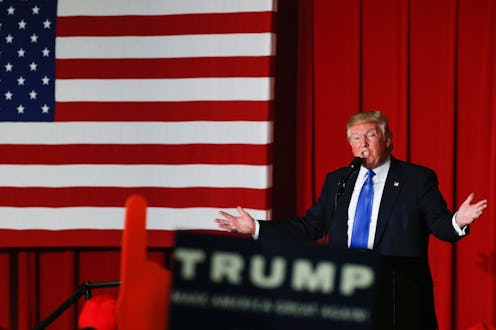News
People Still Want To Escape A Trump Nomination
The Republican Party has slowly, begrudgingly begun uniting behind Donald Trump in the weeks following Republican National Committee Chair Reince Priebus's pronouncement that he is now their presumptive presidential nominee. But an outspoken faction is refusing to fall in line. These anti-Trump Republicans are scheming last-ditch efforts to deny Trump the nomination despite his performance in the primaries, and disenchanted voters are likely wondering if there's any way left to do so. Can Trump be disqualified?
The short answer is no. Trump meets the constitutional criteria for president: He's over the age of 35, a U.S. citizen, and has resided in the country for more than 14 years. But can he be disqualified from the Republican nomination?
Not according to Republican Party rules, which stipulate that to secure the nomination, a candidate must win at least 1,237 delegates at the party's national convention. Trump is almost certain to hit that number in the first round of voting at the convention, when most delegates are bound to vote according to the results of their state or congressional districts' primary election or caucus. Trump is just over 100 delegates short of that number going into Washington's primary on May 24. Ballotpedia reported that there are 343 bound Republican delegates remaining to be won, and Trump is the only candidate on the party's ballot who is still actually running.
Still, there's been plenty of talk since the early stages of the race about disqualification. Former presidential nominee Mitt Romney said that Trump's refusal to release his tax records is "disqualifying." White House spokesmen Josh Earnest said that Trump's suggestion that the United States temporarily ban Muslims from the country "disqualifies" him from the presidency. Joe Scarborough of MSNBC said that Trump's failure to immediately disavow former KKK leader David Duke after he expressed support for Trump was "disqualifying."
Unfortunately for these folks, their moral outrage does not translate to actual rules around qualification. Most of the chatter about deposing Trump involves not disqualification, but unbinding delegates. Were this to occur, delegates would no longer have to vote according to the results of the primaries — meaning that the majority bound to vote for Trump as the rules stand now would instead be able to vote for someone else. Theoretically, that means a different candidate, or even somebody who didn't run, could get the delegates needed to be the party's nominee.
Republican nomination rules are malleable, and 2016's rules will be decided on a week before the convention. It remains to be seen whether enough party members would get behind an effort to defy its voters by undermining the results of the primaries, but we probably shouldn't hold our breath for that. What is clear now is that Trump can't be disqualified.
